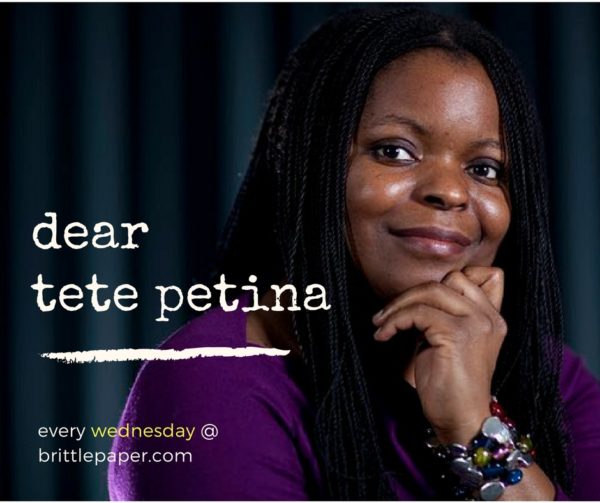Last week, we debuted an advice column for writers, titled Tete Petina. The column is written by novelist Petina Gappah. Gappah kicked off the column with a deeply personal and heartfelt advice on how to handle the disappointment of not being shortlisted for the Caine Prize. [If you haven’t read it, stop whatever you are doing right now and do so here.]
One reader was moved by Tete Petina’s piece and sent us an email with a response, asking us to publish it. It is an honest account that we think every aspiring writer should read.
***
Dear Tete Petina,
I read your advice column on the Caine Prize, and it’s the best thing I’ve read this week! It is so honest and uplifting. I admit to being one of those people who once really wanted to win the Caine Prize, and once, as one who was considered one of the most talented up and coming young writers on the continent, thought I may one day be nominated, at least. As the years went by and this didn’t happen, I moved from feeling happy for others to being bitter. Why not me? I kept asking myself. Was I not talented enough? Was I not only not one of the most talented writers, but also one of the most hardworking? I used to bunk classes at university to focus on my writing. I spent all my money on books. Those who read my writing raved about it and saw not only my talent and potential, but my dedication and hunger. So why was I being deliberately passed over? Furthermore, it seemed that those who seemingly had not put as much effort or were as dedicated to their writing as I was were easily nominated for the Caine Prize. Some of whom would probably never write another work again, have never written another work again, and will probably never write any great work, ever? Why then, not me, who so clearly wore my ambition and hunger as a young writer on my sleeve? These were things I struggled with, Tete Petina, and they tormented me greatly. Living on a continent where it felt like writing wasn’t being taken seriously enough to become something one could pursue, and where opportunities for a young, talented, hungry writer such as myself were so few, the Caine Prize seemed to be the Gatekeeper to an auspicious writing future.
And then, I got accepted into a prestigious creative writing program in the USA, and this changed my writing trajectory. However, there was still and, I admit, still has been, that lingering sadness of somehow feeling ‘kept out’ of the ‘African writing community,’ where I have felt I ought to belong, Tete Petina, and this has been compounded by the sense of community and acceptance I have found in writing communities here in the US, where my confidence and sense as a writer has grown. Why, I felt, if I was good enough to be accepted here, was I not accepted in the place I felt I ought to belong, by the very intellectuals and writers I aspired to emulate? I felt I had begun auspiciously as a writer within the African writing community; I had attended writing workshops and writers and readers alike gushed over my writing; what then, had gone wrong? Furthermore, being accepted in the most prestigious writing communities in the US helped to quell my suspicions, because of being constantly ignored by the African Writing Community, that perhaps I wasn’t a good enough writer and perhaps was even a fraud! It confirmed to me that, truly, there was nothing wrong with my writing, that I am a talented writer. Why, then, did/ does the African writing community not include me in their things, or invite me to be a part of them, or celebrate with me, or recognize me as a writer, as their writer, meanwhile those I consider strangers or foreign do so, and continue to confer upon me their highest honors? This has tormented me greatly, especially because I started writing on the continent and always thought I was part of and wanted to gain entry into the best of the African Writing Community. It has led to an acute feeling of being intellectually and creatively in exile, and caused me to be churlish and deliberately distant from the wonderful embracing writing communities here in the US, while looking wistfully at African Writing Communities where I thought/ think I ought to belong and where I thought I would always end up. Anyway, because of this alienation, I always thought the Caine to be a consecrating ‘ritual’ into being accepted into an ‘African Writing Community’ and recognized as a writer who can write, a writer of the African future who has important things to say. Nevertheless, of late I have come to be more accepting of being here and part of the writing communities in the US, which recognize me as a writer in a way African writing communities have not. I am sort of accepting that this is the place or the writing community that has welcomed me and embraced me as part of their own. It is a sort of resigned accepting—accepting the love that is offered me rather than the love I wish I was offered! Especially as I feel alien to this society and its problems—the continent is where my heart is! But I figure, if I am to (since it seems I shall) settle here, it is best to actively try and be a part of this society that has decided to invite me and embrace me as having something valuable, as a writer and thinker. It has shown me great kindness in this way, in giving me what I need as a writer and what has helped me thrive—a sense of community and belonging! This has been part of my struggles as a writer, Tete Petina!
Thank you for your Advice Column. It has brought me to this place of honest, brutal reflection.
Yours,
Anonymous.










Abi May 22, 2017 23:49
This broke my heart. I think you shouldn't worry about wanting to belong. I think I know who you are. I want you to know that I love your writing. You are so accomplished and you are doing so well in your writing, I don't know why you are so sad. Your stories have energy and they are unique. And yes, maybe you are being ignored right now, but all great writers were always out of sync with their time because they were ahead of their time. You will get the recognition you deserve in time if you just keep writing and stay true to yourself. Accept the writing communities that have taken you in; it means they are in sync with you and they will help you get your writing where it needs to go. You may not be where you wanted to be with the African writing community but you are where you are meant to be and need to be. We attract what we desire. You desired ambition and this is what you have gotten. Enjoy it and know you are exactly where you need to be to fulfill your ambitions.